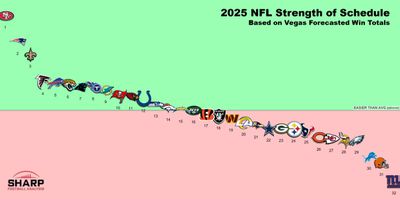
It’s an imperfect science, but here’s what we know about the Falcons’ 2025 strength of schedule
Atlanta Falcons fans have heard this before; the team has an “easy” schedule on the horizon.
“The division is terrible.”
“The team doesn’t even need 10 wins to make the playoffs.”
“This is the year, just win the division.”
While not entirely inaccurate in theory, this line of thinking is a trap that fans fall for every year. The stage is set for this trend to continue in 2025, where the Falcons will have the fourth “easiest” Strength of Schedule (SOS) based on projected Vegas win totals.

Sharp Football Analysis
Why use projected win totals? This article does a good job breaking it down, but here’s the general reasoning:
They incorporate current information about teams, including offseason moves, injuries, and coaching changes. Sportsbooks craft these projections to predict future performance, making them more reflective of a team’s current capabilities. While no SOS metric is perfect, using Vegas win totals better indicates what teams could look like in the upcoming season than relying on the previous year’s wins.
These projections give us a solid understanding of how teams are viewed today, and they have the potential to shift as the offseason rolls on. We won’t see considerable shifts from these starting points for the most part, but there is always a serious injury or surprise trade that could change that.
Our 2025 opponents are set
— Atlanta Falcons (@AtlantaFalcons) January 6, 2025
Outside their standard NFC South opponents, the Falcons will face off against the entire NFC West and AFC East, along with games against the Washington Commanders, Minnesota Vikings, and Indianapolis Colts. Home and away designations are already known, but the official schedule release will tell us if any games take the team overseas.
While those finer details are accounted for in some fashion, they are often lost in the bigger picture when fans start talking about how “easy” the season should be. This is the NFL; nothing is easy.
Take 2024, for example. Before the season started, the Washington Commanders were penciled in as a W, and the opposite was felt about the Philadelphia Eagles. By the end of the year, few wanted to tussle with the Commanders, and no one could believe the Falcons were one of the Eagles’ two losses on the entire season.
As comprehensive as these SOS rankings may be, they cannot predict the growth and regression in a season. They cannot predict which rookies will hit the ground sprinting and which vets will fall off a cliff; the focus is simply on “total wins.” Teams evolve by the week, and the unpredictable nature of this game is why so many people tune in each season.
If SOS were a sure-fire stat, we wouldn’t turn up for the games. It is a solid indicator of what to expect, but fans often misuse it when trying to make sense of a season that’s going off the rails or is going better than expected. I’m not saying to ignore the stat once the season begins, but it is far less helpful to you by that point because it is based on projections that are now happening in real time.
Maybe Vegas was wrong about your team’s quarterback situation, or perhaps they overestimated your opponents’ signings. We won’t know until they play the games, and those outcomes will tell us far more about the teams than a predictive model.
As we eagerly await the official release, keep all of this in mind and remember that, however good you feel about the scheduled opponents, their fans are likely to feel the same way about your Falcons.
